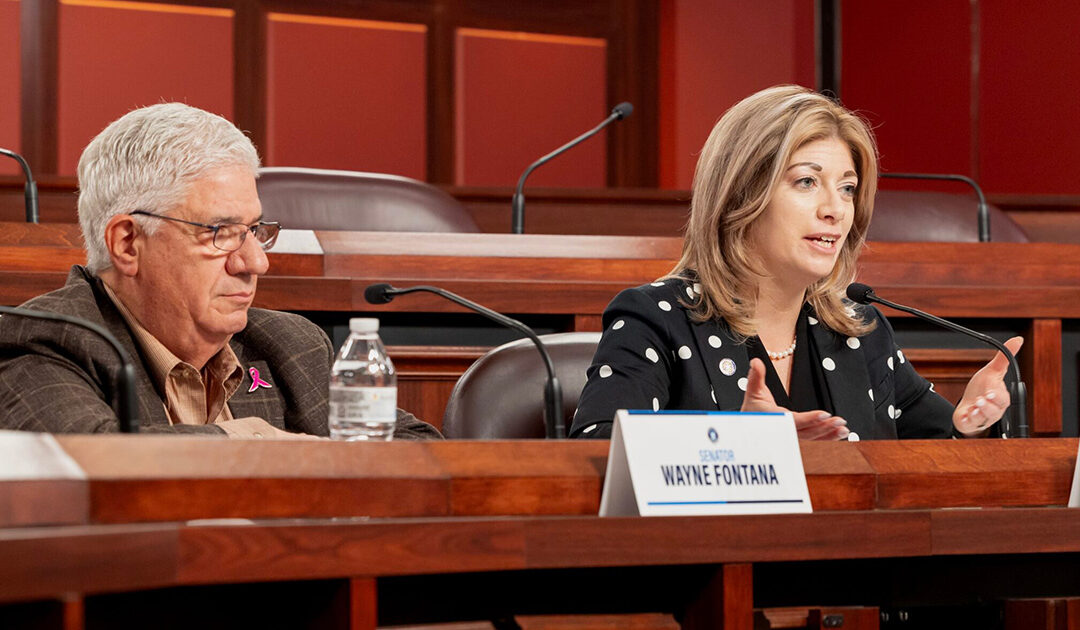HARRISBURG − October 4, 2024 – State Senator Katie Muth (D-Chester/Montgomery/Berks), chair of the Pennsylvania Senate Democratic Policy Committee, joined state Sen. Wayne Fontana (D-Allegheny) to host the second in a series of public hearings on the issues with Pennsylvania’s lack of a consistent system of countywide property reassessments.
The hearing, held yesterday at the Pennsylvania State Capitol in Harrisburg, featured three panels of discussion highlighting the issues with Pennsylvania’s property reassessment system and the impact reassessments have on municipalities, school districts, and real estate. The first Senate Democratic Policy Committee hearing on property reassessments was held in Pittsburgh in July.
“The Policy Committee hearing highlighted how, yet again, Pennsylvania lags behind the rest of the nation in tax fairness, especially in property tax policy. The bipartisan participation in this hearing shows that reassessment is not a partisan issue – the lack of regular reassessments is a problem across the Commonwealth. The General Assembly needs to prioritize legislation that ensures a property tax system that is fair and uniform across all counties, and provides counties resources for initial implementation,” Muth said. “Pennsylvania is only the state in the nation that does not have some form of required property reassessment evaluation process, yet some legislators and government officials continue to rely on tax exemptions for certain business sectors and regions to try and grow our state’s economy and incentivize population growth instead of realizing that implementing a fair and equitable tax system is the only way to ensure economic fairness and sustainability.”
As of August of 2023, Pennsylvania has officially become the only state in the nation which does not have statutorily mandated reassessments on a fixed cycle. A study done by the Center for Rural Pennsylvania found that counties conducting countywide reassessments on a regular, reoccurring schedule achieve multiple benefits for the county. Reassessments enable counties to derive more tax revenue per mill, thereby lowering tax rates and decreasing the overall residential tax burden. Additionally, countywide reassessments were shown to improve property taxation equity and uniformity across the county.
“The testimony we heard at these hearings confirmed what taxpayers across the commonwealth know, that Pennsylvania’s property tax assessment system is dysfunctional, costly, and unfair. There is no question that people living in counties that do not reassess are being taxed too high to make up for these outdated property values, while the people that live and work in counties that do reassess are being punished for being responsible,” Fontana added. “Make no mistake that this statewide problem needs a statewide solution, which is why I am asking taxpayers, advocates, businesses, local governments, school districts, and elected officials to demand we put an end to this inequity by advocating for routine reassessments statewide.”
Senator Fontana indicated at the hearing that he plans to work with the stakeholders and testifiers that participated at today’s hearing to craft legislation to address the issues with the reassessment system in Pennsylvania.
Participants in the hearing included Renee Reynolds, Director, State Tax Equalization Board; David Greene, Executive Director, Pennsylvania Local Government Commission; Dr. Jeffery Weber, researcher; Tim Shrom, Pennsylvania Association of School Business Officials; Lisa Schaefer, Executive Director, County Commissioners Association of Pennsylvania; and Josh Zeyn, Assessors Association of Pennsylvania.
State Sen. Lindsey Williams (D-Allegheny) also participated in the hearing virtually.
For more information on this policy hearing and to access all submitted testimony and a full recording of today’s hearing, visit www.SenatorMuth.com/policy.
Testimony
Panel 1: Overview
Panel 2: Statewide Effects
- David Greene, Esq. – Executive Director, Pennsylvania Local Government Commission
- Dr. Jeffrey Weber – Former Associate Provost & Professor of Public Administration, East Stroudsburg University | on behalf of the Center for Rural Pennsylvania
Panel 3: Policy Solutions

